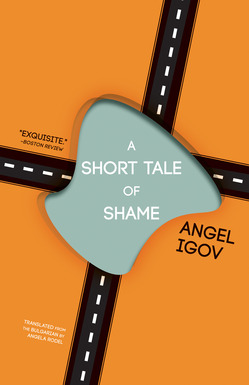Angel Igov’s enigmatic 2011 novel, co-winner of the 2012 Bulgarian Writers Contest, tells a deceptively simple story about three friends, Maya, Sirma and Spartacus, who have taken a semester’s leave from college to travel. Along the way they hope to clarify their goals and determine if their studies are headed in the best possible direction.
But “A Short Tale of Shame” is more than a contemporary tale of self-discovery and wanderlust. Philosophical and deeply moving, the book delves into the psyches of all three characters; in addition,it juxtaposes each one’s troubled relationship with an acquaintance—or maybe  a person better described as a force of nature–named Elena. While Elena and Spartacus had a short, tumultuous love affair a few months back, the wily Elena has also had a profound impact on both women, causing them to question their ideas about friendship, honor and loyalty.
Later, when Boril, a middle-aged widower who picks the hitchhiking threesome up in his fancy sports car, is unveiled as Elena’s father, an intense few days in the Greek islands unfold. Although the plot is obviously contrived, it works.
In fact, all four protagonists are vividly, if sparely, drawn and the ambivalence at the heart of their relationship with Elena will resonate with anyone who has even befriended a manipulative, attention craving, Queen Bee. Igov’s long, run-on sentences convey Elena’s energy and allure: “Elena was like some apparition, a witch, and Sirma remembered that she had used that word, but as a compliment, she had always been hanging around them but never with them, she had watched, laughed and enjoyed seeing them writhe in the sticky semi-darkness, sometimes she told them what scum they were, while the next time she’d tell them how much she loved them, and she often gave them money to buy junk, and then at one point she simply disappeared, vanished into thin air, she just got sick of it, Sirma thought, and changed groups.â€
It is these qualities—Elena’s ability to cajole, seduce and then reject–that prods each member of the quartet to parse what it is that they want from others and identify how they expect colleagues, friends and romantic partners to behave. What’s more, it allows them to confront their own demons—jealousy, competition and insecurity among them—feelings that came unleashed by proximity to Elena. For Boril, in the throes of mourning the loss of his wife to cancer, there is no choice but to love his difficult child. The others, however, are not so encumbered and in different ways and to differing degrees, are using the road trip to make decisions about the who, what, when and where of their lives. It’s a key moment in their coming of age and it is both chilling and empowering for them to lay claim to their limited authority.
In fact, as Maya, Sirma and Spartacus split from Boril, it is unclear if they’ll ever see him again or if they’ll collectively or individually confront Elena to discuss the pall she has cast on them. Perhaps it doesn’t matter. Instead, the task is for each of them to extricate him-or-herself from the muck that is Elena and move on.
Igov has written a world that is filled with despair, doubt and angst. At the same time, opportunities and choices abound. Whether they’ll be pit stops or a final destination remains an open question.
“A Short Tale of Shame,” by Angel Igov, Translated from Bulgarian by Angela Rodel, 145 pages, $`13.95 paperback, Open Letter Press. Originally published in Sofia, Bulgaria in 2011. U.S. release date: May 21, 2013.


Leave a Reply